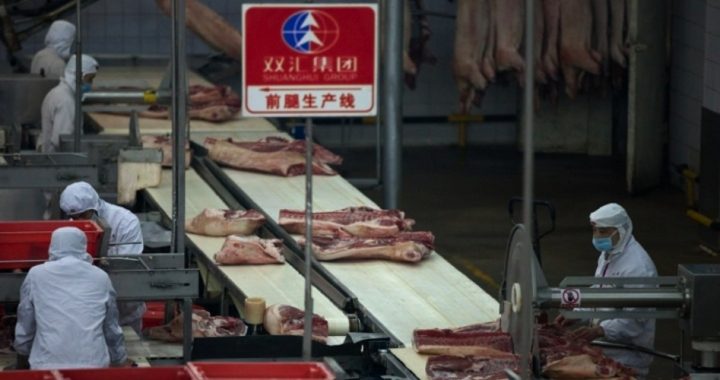
On September 6, the U.S. Committee on Foreign Investment approved a deal valued at approximately $7.1 billion allowing China’s Shuanghui International Holdings Ltd (Shuanghui Group) to officially take ownership of Smithfield, Virginia-based Smithfield Foods Inc., the world’s largest pork producer. Shuanghui had already purchased all of Smithfield’s stock back in May for approximately $4.72 billion. “The deal, which would be the biggest purchase of a U.S. company by a Chinese firm, still needs shareholder approval at a special meeting scheduled for September 24,” according to Reuters. Shuanghui announced that Smithfield would be listed on the Hong Kong Stock Exchange after the takeover was complete.
In addition to being the world’s largest pork producer, Smithfield Foods’ BioScience division is one of the only domestic manufacturers of Heparin Sodium USP, an anticoagulant commonly used in hospitals for patients following surgery.
A startling revelation that Reuters and other Western media fail to mention is that Shuanghui International Holdings is controlled by the Communist Party of China.
In various English language sources geared to readers in the West, Shuanghui International Holdings is presented as a private corporation. For example, a photograph from the Associated Press of a pork processing plant owned by Shuanghui in Luoche, China, has this caption: “Shuanghui’s bid for Smithfield Foods Ltd. represents a big step up on the global stage for Chinese entrepreneurs who are emerging from the shadow of state-owned corporate giants.” This caption suggests that Shuanghui is one a few enterprises in China that is not owned by the state, or Chinese government, enabling the reader to conclude that Shuanghui is a private enterprise.
In another example, the regular English version of the Wikipedia page for Shuanghui lists the company’s type as “Private with public subsidiary.” The Chinese language version of Shuanghui’s Wikipedia page (in Mandarin characters), however, says the opposite. The Chinese zh.wikipedia page for Shuanghui identifies the company type “國有企業,” which is translated into “State-owned enterprises” by Bing, Microsoft’s search engine and online translator.
Additionally, the English en.wikipedia page for Shuanghui lists the company as having been founded in 1958. Anyone with a basic public school education of world history will recall that 1958 was the year the Great Leap Forward was first initiated by the Communist Party of China, which at the time was under the closed and totalitarian control of Mao Tse-tung. Under “History” the first sentence of the English wiki for Shuanghui reads, “Shuanghui was set up by the local Luohe City Government in 1958 as a single processing plant.” In 1958 there were absolutely no traces of private or free enterprise in mainland Communist China, especially in the local city governments. This basic historical fact should be more than enough to raise a red flag.
Both the English and Mandarin Wikipedia pages for Shuanghui identify the company’s leader as chairman Wan Long or “萬隆,” which being retranslated into English gives you the alternate spelling of “Bandung” but is the same person. Apparently, Shuanghui has two completely different company websites: one in Mandarin for Chinese readers and one for international visitors in English.
Translated into English, the official Mandarin website for Shuanghui provides a biography of Wan Long (spelled “Bandung”) that identifies him as a member of the Communist Party of China, a former soldier in the Army (PLA, the People’s Liberation Army), and representative to the Ninth and Tenth National People’s Congress, which is the unicameral legislative body (or parliament) of the People’s Republic of China. In the official international version of the company website, Wan Long’s biography, which is much smaller than the Mandarin online version, conveniently omits any mention of his membership in the Communist Party, service in the PLA military, and terms as a representative to the National People’s Congress.
A simple Google Image search of the Chinese characters “萬隆” (Wan Long’s name in Mandarin) quickly generates a photo of Wan Long raising his right arm in a clenched fist, which is the international symbol for socialism and communism. Wan Long is seen doing this while standing in front of his factory plant employees in Louche, China, who also are giving the same communist salute.
Upon further research, it turns out that this photo of Wan Long’s clenched-fist gesture is credited to the following Chinese website: www.wenming.cn. This is the official website for the Central Spiritual Civilization Steering Committee (also referred to the “the Central Committee of Civilization”) of the Communist Party of China. The purpose of this committee — one of the many such groups under the Communist Party of China Central Committee — is that of ministry of propaganda for the Communist Party of China within mainland China.
So former two-term government representative and Chinese Communist Party member Wan Long is now the new owner of the first American business to fall prey to the control of the Communist Party of China.
As the United States and China proceed to work out a bilateral investment treaty which would enable more Chinese state-owned enterprises to openly purchase American companies, this acquisition of Smithfield Foods by Shuanghui serves as a preview of what could eventually be the norm, potentially endangering U.S. food and pharmaceutical security.
Photo of workers at a pork processing plant in Central China owned by Shuanghui Group: AP Images




